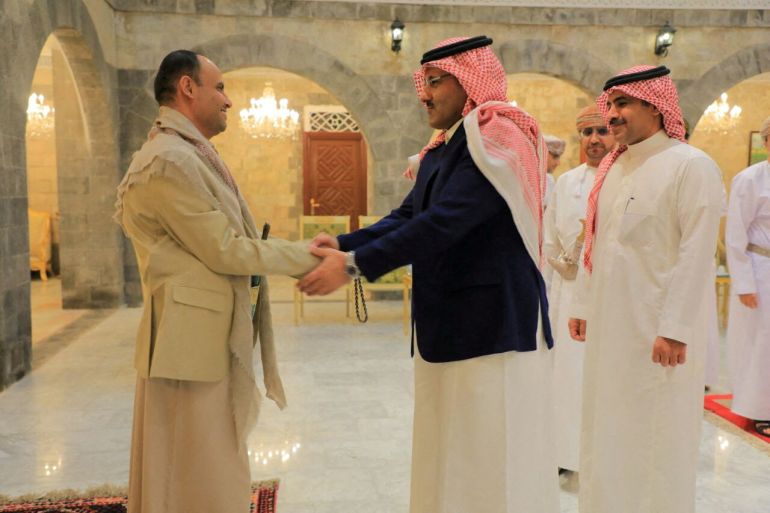At long last, there is real hope for peace in Yemen
The international community owes it to long-suffering Yemenis to not let the current momentum go the way of previous flurries of hope.

Mustn’t jinx anything by talking about it too loudly. But for the first time in years, Yemen – scene of one of the cruelest conflicts and humanitarian tragedies in recent decades – offers some real grounds for hope.
While the Yemenis must decide on their own political future, the international community owes it to them to do whatever is possible to support the current momentum – before it goes the way of previous flurries of optimism.
Despite formally elapsing last October, the UN-brokered truce, which began in April 2022, is largely holding. This was a major step. The agreement led to reduced violence and improved humanitarian access throughout Yemen. But the resumption of full-scale violence remains a real possibility. All sides need to transform this truce into a permanent and comprehensive ceasefire with monitoring arrangements.
This will take time. But there are 21.6 million Yemenis in desperate need of humanitarian assistance, which has to be continued. Strengthening the ability of local authorities to provide basic services is one way of doing this.
Saudi Arabia and Ansar Allah, also known as the Houthis, are now talking directly and increasingly openly. Two high-level Saudi-Omani delegations visited Sanaa earlier this year. Such meetings, aimed at achieving a Saudi-Houthi modus vivendi, must also gradually involve the perspectives of others. Simultaneously, Riyadh has to ensure these discussions don’t undermine talks between the internationally recognised government of Yemen, represented by the Presidential Leadership Council (PLC), and Ansar Allah.
Parallel dialogues continue on the parameters of a roadmap to advance the peace process among a range of Yemeni, regional and international actors. Here, coordination with the UN Special Envoy is key. Consultations with a broad spectrum of actors, including women, youth and civil society, must feed into the peace process so that international action can contribute to the conditions necessary for inclusive intra-Yemeni political dialogue.
Across the region, other positive signs are also emerging. Saudi-Iranian talks in Baghdad and Muscat led to the China-brokered Trilateral Statement in March this year. With embassies reopening and President Ebrahim Raisi of Iran even considering an invitation from Saudi King Salman to Riyadh, careful handling could see the beginning of a detente between Saudi Arabia and Iran. While both sides remain sceptical of the other, such reconciliation could yield many fruits, not just for Yemen but also for maritime security, economic cooperation, Lebanon and Iraq.
Two developments offer further grounds for optimism about building confidence. In April, a large prisoner exchange was brokered by the UN Special Envoy Hans Grundberg and the Red Cross, leading to a welcome domino effect of more prisoner deals. Secondly, efforts are finally underway to make safe the rusting ship FSO Safer, following an agreement between the PLC and the Houthis, which could avert an environmental catastrophe four times bigger than the Exxon Valdez.
Additionally, flights from Sanaa have slowly been increasing since the first commercial plane in six years left the Yemeni capital in May 2022, while Hajj pilgrims departed Sanaa airport for Jeddah in June for the first time since 2016. These agreements on compassionate and technical grounds should provide the foundation for exchanges on trickier political issues.
But there is a long way to go before these encouraging signs are transformed into a comprehensive resolution of the conflict. This requires a coordinated approach among all key actors both to develop a viable way forward and then to persuade all parties to stick to it. Reactivating coordination formats and developing innovative means of sitting together are needed.
For peace to last, only the Yemenis themselves – not external actors claiming to act on their behalf – can decide on their political future. That may sound glaringly obvious, but it is surprising how often this fact appears to be overlooked. Given the untold misery suffered in Yemen over the past nine years, history will judge the international community harshly if it fails to capitalise on the recent positive trends.
This is vital mainly for Yemenis and their neighbours. But it’s also in the interests of Western countries who need to convince other regions that the invasion of Ukraine has not cast all other crises on the back burner. Moving fast, before momentum is lost, is as essential as doing it in ways that include all the main Yemeni parties.
The views expressed in this article are the authors’ own and do not necessarily reflect Al Jazeera’s editorial stance.